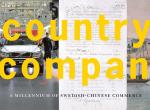Engelska
Mest sålda

-
Title:
The Little Country With The Big Companies
-
Reviews:
-
Release Date:
-
Genre:
- Historia & Arkeologi
-
Format:
Bok
-
Availability:
Beställningsvara Leveranstid: från 3 vardagar
-
Description:
Från vikingar till miljöteknik över tusen år av möten I gravar från de gamla svenska vikingasamhällena Valsgärde och Birka har man hittat bevis för att kinesiska textilier fann vägen till Sverige för långt mer än tusen år sedan. Då var det kamelryggen och Sidenvägen som gällde. Idag, på 2000-talet,...
The Little Country With The Big Companies Bok
Från vikingar till miljöteknik över tusen år av möten I gravar från de gamla svenska vikingasamhällena Valsgärde och Birka har man hittat bevis för att kinesiska textilier fann vägen till Sverige för långt mer än tusen år sedan. Då var det kamelryggen och Sidenvägen som gällde. Idag, på 2000-talet, bedriver drygt 10 000 svenska företag handel med Kina och fler än 500 svenska företag har verksamhet på plats i landet. Under seklens lopp har Kina och Sverige fortsatt att mötas och utvecklas tillsammans. Kinesernas skottkärra har blivit ett måste för den trädgårdsintresserade svensken och vi har länge firat nyår, jubileer och bröllop med kinesiska fyrverkerier. Med den här boken bjuder vi på en historisk och nutida glimt in i relationen mellan Kina och Sverige. Finns tillgänglig på engelska och kinesiska (ange önskat språk vid beställning).

-
Title:
Eritrea - A Classic African Dictator Took Over
-
Reviews:
-
Release Date:
-
Genre:
- Historia & Arkeologi
-
Format:
Bok
-
Availability:
Beställningsvara Leveranstid: från 3 vardagar
-
Description:
Many different events, wrong decisions, failure to make decisions, and incompetence resulted in a country that once had shown every opportunity to flourish, instead became a dictatorship. Interlaced with these 12 individual interviews come descriptions of the author's own experiences when travellin...
Eritrea - A Classic African Dictator Took Over Bok
Many different events, wrong decisions, failure to make decisions, and incompetence resulted in a country that once had shown every opportunity to flourish, instead became a dictatorship. Interlaced with these 12 individual interviews come descriptions of the author's own experiences when travelling in Eritrea on three different occasions in the company of the ELF liberation movement, during the struggle for freedom.

-
Title:
How Neocons Tried To Destroy The World - Russia After Yeltsin
-
Reviews:
-
Release Date:
-
Genre:
- Historia & Arkeologi
-
Format:
Bok
-
Availability:
Beställningsvara Leveranstid: från 3 vardagar
-
Description:
After President George H W Bush's reelection defeat, formulating a long-term policy toward post-Soviet Russia fell to Bill Clinton, who became president in January 1993. The general approach adopted by the Clinton administration - its underlying assumptions, purposes, and implementation - has been ...
After President George H W Bush's reelection defeat, formulating a long-term policy toward post-Soviet Russia fell to Bill Clinton, who became president in January 1993. The general approach adopted by the Clinton administration - its underlying assumptions, purposes, and implementation - has been Washington's policy ever since, through both terms of the second President Bush. It was still in place when President Barack Obama took office in January 2009. President Donald Trump has tried to change this but seems in this question completely be ruled by 'DEEP STATE'. Given Russia's singular potential for both essential cooperation and unprecedented dangers, the Clinton administration inherited historic responsibility for, as pundits say, getting Russia policy right. It failed disastrously, though officials involved in those decisions have continuedto defend these failures. It does not require a degree in international relations to understand that the first principle of policy toward post-Communist Russia should have been to heed the Hippocratic injunction: Do no harm! Do nothing to undermine its fragile stability, nothing to dissuade the Kremlin from giving first priority to repairing the nation's crumbling infrastructures, nothing to cause it to rely more heavily on its stockpiles of superpower weapons instead of reducing them, nothing to make Moscow less than fully cooperative with the West in those and other vital pursuits. Everything else in that shattered country was of far less consequence. Instead, beginning in the early 1990s, Washington simultaneously conducted, underDemocrats and Republicans, two fundamentally different policies toward post-Soviet Russia - one decorative and outwardly reassuring, the other real and exceedingly reckless. The decorative policy, which was generally taken at face value in the UnitedStates professed to have replaced America's previous Cold War intentions with a generous relationship of "strategic partnership and friendship". The public image of this approach featured happy-talk meetings between the American and Russian presidents, first "Bill and Boris" (Clinton and Yeltsin), then "George and Vladimir" (Bush and Putin). The real US policy was different - a relentless, winner-take-all exploitation of Russia`s post-1991 weakness. Accompanied by broken American promises, condescending lectures, and demands for unilateral concessions, it was, and remains, disregardingofficial rhetoric, even more aggressive and uncompromising than was Washington`s approach to Soviet Communist Russia. It is important to specify the defining elements of this actual policy as they unfolded - with fulsome support in both major American political parties, influential media, and liberal and conservative think tanks - since the early 1990s, if only because they are firmly lodged in Moscow`s memory: Morimer Zuckerman, member of New York Council for Foreign Relations, owner to US News & World Report, describes what happened at the plunder of Russia under Yeltsin. Boris Yeltsin and his "free market reformers" were part of one of the most hidden and most criminal looting operations in CIA history. It was the rape of Russia by a corrupted circle of treasonous Soviet KGB generals, together with their select young KGB protégés, who were transformed through the operation into billionaire oligarchs. It was an economic rape made possible only through Western banks and the so-called "democracy machinery" of Washington under three successive presidents - Ronald Reagan, George H.W. Bush, and Bill Clinton. A growing military encirclement of Russia, on and near its borders, by US and NATO bases, which by August 2008 were already ensconced or being planned in at least half of the fourteen other former Soviet republics, from the Baltics and Ukraine to Georgia, Azerbaijan, and the new states of Central Asia. The result is a reemerging iron curtain and the remilitarization of American-Russian relations, developments only belatedly noted, and almost always misexplained, in the United States. In the aftermath of the 2008 Georgian War, for example, a US senator angrily declared. "We`re not going to let Russia, so soon after the Iron Curtain fell, to again draw a dividing line across Europe." A New York Times editorial added that such a 'redivision of Europe' could not be tolerated." But it was the eastward expansion of the NATO military alliance, beginning in the 1990s, that imposed 'new dividing lines in Europe,' certainly in the eyes of Russia`s political leaders, and threatened their country with 'being pushed' behind a new 'iron curtain'.
Utvalt - Engelska
After President George H W Bush's reelection defeat, formulating a long-term policy toward post-Soviet Russia fell to Bill Clinton, who became president in January 1993. The general approach adopted ...
- Populärt
- Mest sålda
- Mest bokade
- Senast släppta
- Kommande
- Pris
- A-Ö
- Välj
- 0 - 9
- A
- B
- C
- D
- E
- F
- G
- H
- I
- J
- K
- L
- M
- N
- O
- P
- Q
- R
- S
- T
- U
- V
- W
- X
- Y
- Z
- Å
- Ä
- Ö
- Övrigt
